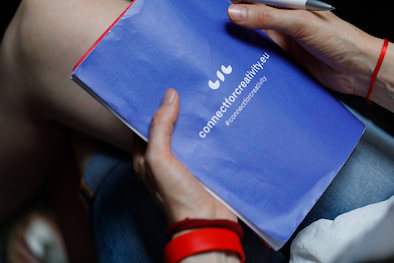Creative hubs boost confidence amongst people and countries
As part of the Connect for Creative project, a research titled ‘Creative Hubs – Opportunities and Challenges for Intercultural Dialogue’ was conducted with more than 400 participants. The research report elaborates on how future opportunities for collaboration can best be exploited as well as examining how creative hubs and creativity can help strengthen intercultural dialogue.
Connect for Creativity project, co-funded by the European Union and the Republic of Turkey, is led by the British Council, in collaboration with ATÖLYE and Abdullah Gül University in Turkey, BIOS in Greece and Nova Iskra in Serbia as part of the EU-Turkey Intercultural Dialogue Programme of the Yunus Emre Institute. An international research was conducted in partnership with the Creative Economy Team at Cardiff University, as the first of its kind in the field of the creative economy to focus on intercultural dialogue. The final report of the research titled ‘Creative Hubs- Opportunities and Challenges for Intercultural Dialogue’ focuses on the role of creative hubs in strengthening intercultural dialogue.
The research sheds light on creative economy landscape in Turkey and Europe
Connect for Creativity aims to form a network of creative hubs across Europe to foster creative exploration and collaboration that contributes to building a more cohesive, open and connected civil society. To support this objective, the research focuses on creative economy in Turkey and in Europe. The Creative Economy Team at Cardiff University gathered insights from more than 400 people within the course of five months representing four different countries, namely Greece, Serbia, Turkey and the UK. While creative hub managers, members, academics, local private and public stakeholders were surveyed, experts were invited to participate in workshops to take a clearer picture of the reality on the ground. The research also analyzed our project partners in detail: ATÖLYE in Turkey, BIOS in Greece, Nova Iskra in Serbia and Rabble Studio in the UK as four different case studies.
75 per cent of the participants agree that creative hubs contribute to intercultural dialogue
The findings provide clear evidence that creative hubs are playing an increasingly important role in the development of creative and digital communities, and the economies of the places in which they are located. While the importance and value of social relations in creative hubs also finds a wide consensus among academics, the underlying engagements that go beyond the hub members to wider civil society are currently not well understood. 75 per cent of the survey respondents stated that they believe creative hubs contribute to and are platforms and enablers for intercultural dialogue. Across the four countries in the study, 38 culturally diverse groups with which creative hubs engage were identified. The surveyed creative hubs have international connections to 56 countries. In the light of these findings, it is evident that intercultural dialogue creates a number of benefits not only for the creative hub and its members, but also for other related stakeholders, policy makers and wider society.
Creative hubs need access to finance, knowledge and skills to develop
The social impact of creative hubs can often be overlooked by creative hub managers, members or stakeholders who either perceive it as a less significant part of their strategic plan or operations or because it is a relatively new way of considering value and contribution. The key factors identified in enabling future growth and success of creative hubs are access to finance, information, skills, experience and a support environment from stakeholders and partners to achieve this.
“Creativity and cross-cultural competency are among the ten most important skills for the future workforce”
Concerning the research report, Cherry Gough, Director Turkey, British Council highlighted the importance of creative industries by saying, “Over the last ten years the creative industries have become a global phenomenon. Creative hubs are increasing in number and rapidly becoming an important player in supporting creative communities globally. Creativity and cross-cultural competency are among the ten most important skills for the future workforce, as defined by the Institute for the Future. It is often said that the most successful economies and societies in the 21st century will be the most creative ones, given their contribution to prosperity and innovation.” She then added, “The British Council is active in supporting the creative industries and creative hubs across the globe. Together with policymakers, creative talent and communities we develop relevant, diverse and future-facing creative economies, with long-term links to the UK. We are particularly keen to promote collaboration between culture, enterprise and digital technology, accelerating growth in Research and Development (R&D) and new business models.”
Understanding intercultural dialogue has never been more important. The emergence of a clearer understanding of the potential for creative hubs to actively and strategically engage in this has put a focus on what is required to support and enable this in the future. This report titled ‘Creative Hubs – Opportunities and Challenges for Intercultural Dialogue’ aims to encourage stakeholders and hubs to take responsibility in collaborating to together consider how best to utilize these opportunities in the future.
This report is a first step to better understand the underlying concepts of how creative hubs create intercultural dialogue and will be used to advise our partners and networks to build on the findings.
You can read the entire research report on connectforcreativity.eu website.











